China Unicom's Strategic Analysis for New Zealand Market Entry
VerifiedAdded on 2021/04/24
|15
|3332
|26
Report
AI Summary
This report provides a detailed analysis of China Unicom's strategic plan to expand its telecommunication business into New Zealand. It begins with an executive summary and introduction highlighting the attractiveness of the New Zealand market due to its resources, skilled labor, and favorable business environment. The report then delves into a location analysis, followed by a PESTLE analysis, examining political, economic, societal, technological, legal, and environmental factors influencing the market. An industry structure analysis using Porter's Five Forces is presented to assess competitive rivalry, the threat of substitutes, bargaining power of suppliers and buyers, and the threat of new entrants. The report explores market entry strategies, specifically focusing on licensing as a suitable option. It further examines the impact of formal and informal institutions, including business rules, trade barriers, cultures, and ethics. The report concludes with a discussion on ethics, corporate social responsibility, and sustainability, emphasizing the importance of ethical practices and a commitment to societal well-being for long-term success. References are included to support the analysis.
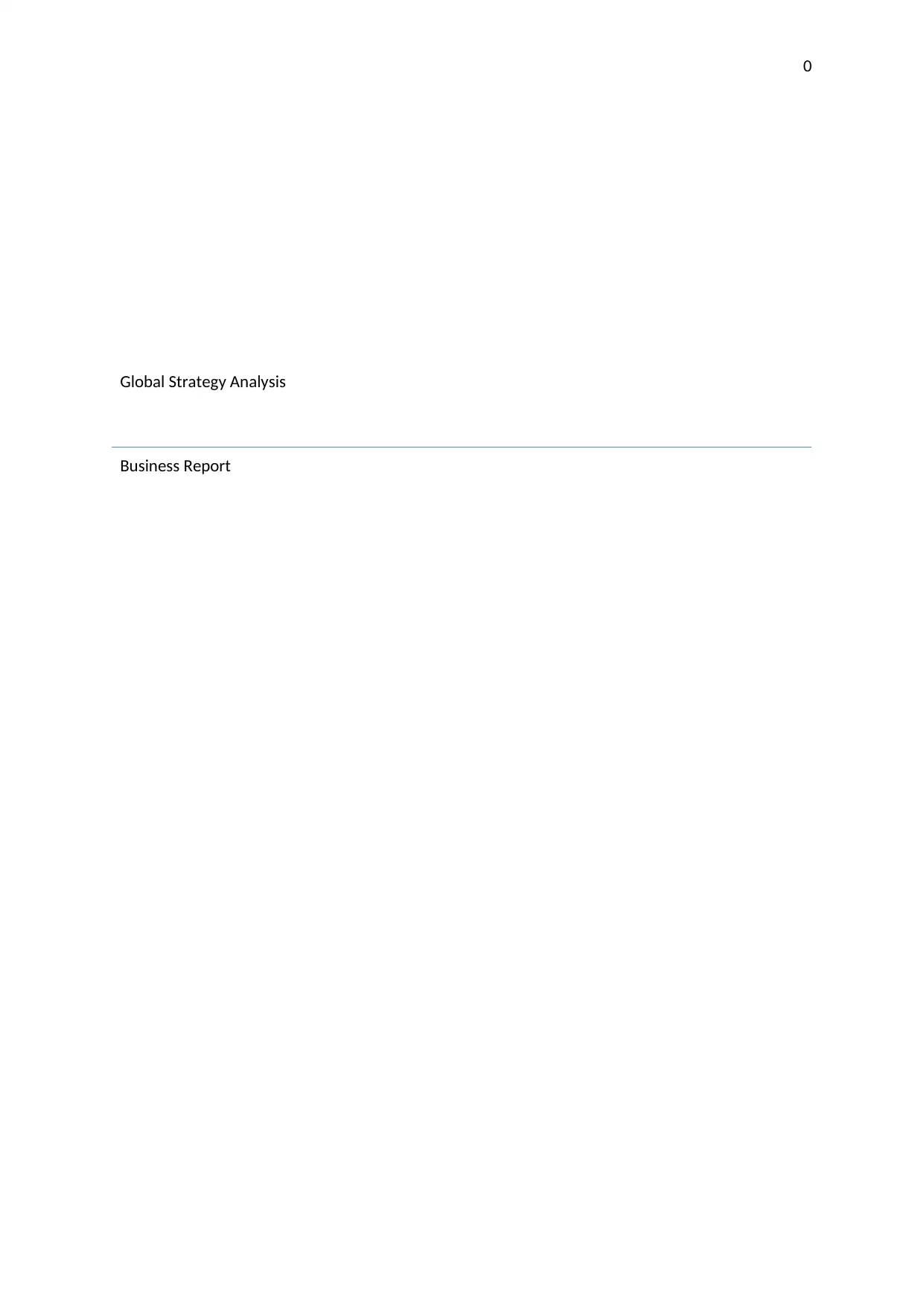
0
Global Strategy Analysis
Business Report
Global Strategy Analysis
Business Report
Paraphrase This Document
Need a fresh take? Get an instant paraphrase of this document with our AI Paraphraser
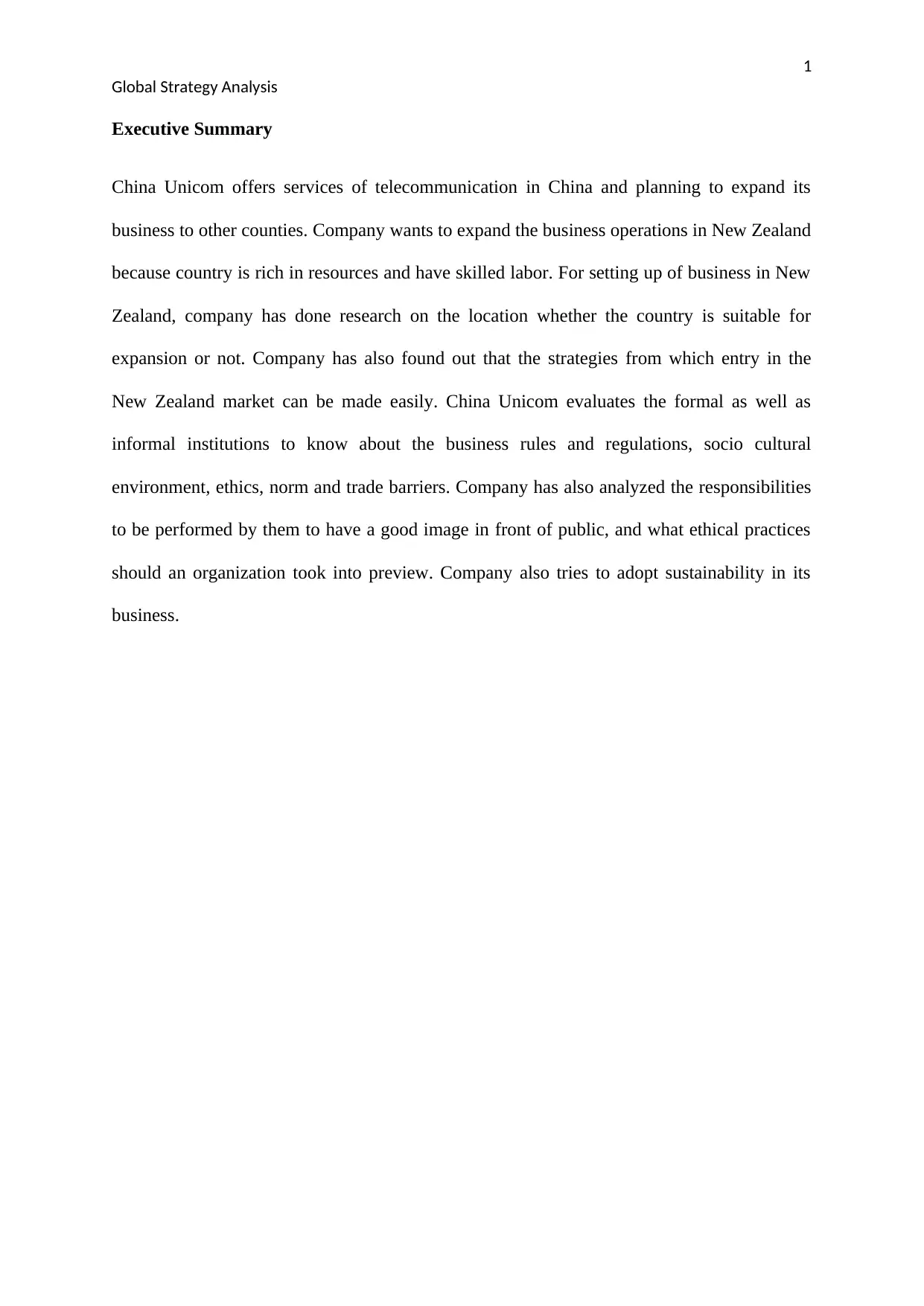
1
Global Strategy Analysis
Executive Summary
China Unicom offers services of telecommunication in China and planning to expand its
business to other counties. Company wants to expand the business operations in New Zealand
because country is rich in resources and have skilled labor. For setting up of business in New
Zealand, company has done research on the location whether the country is suitable for
expansion or not. Company has also found out that the strategies from which entry in the
New Zealand market can be made easily. China Unicom evaluates the formal as well as
informal institutions to know about the business rules and regulations, socio cultural
environment, ethics, norm and trade barriers. Company has also analyzed the responsibilities
to be performed by them to have a good image in front of public, and what ethical practices
should an organization took into preview. Company also tries to adopt sustainability in its
business.
Global Strategy Analysis
Executive Summary
China Unicom offers services of telecommunication in China and planning to expand its
business to other counties. Company wants to expand the business operations in New Zealand
because country is rich in resources and have skilled labor. For setting up of business in New
Zealand, company has done research on the location whether the country is suitable for
expansion or not. Company has also found out that the strategies from which entry in the
New Zealand market can be made easily. China Unicom evaluates the formal as well as
informal institutions to know about the business rules and regulations, socio cultural
environment, ethics, norm and trade barriers. Company has also analyzed the responsibilities
to be performed by them to have a good image in front of public, and what ethical practices
should an organization took into preview. Company also tries to adopt sustainability in its
business.
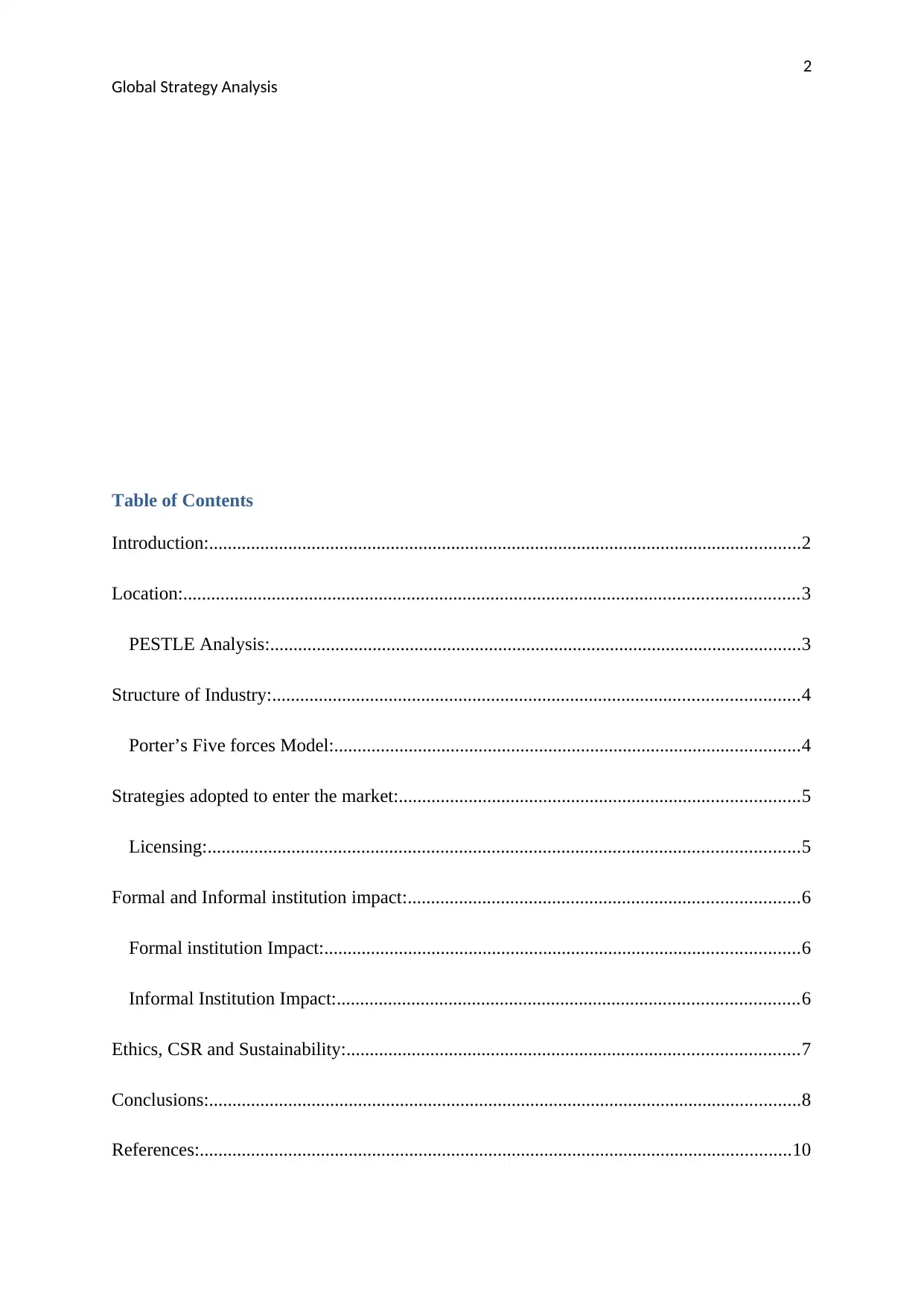
2
Global Strategy Analysis
Table of Contents
Introduction:...............................................................................................................................2
Location:....................................................................................................................................3
PESTLE Analysis:..................................................................................................................3
Structure of Industry:.................................................................................................................4
Porter’s Five forces Model:....................................................................................................4
Strategies adopted to enter the market:......................................................................................5
Licensing:...............................................................................................................................5
Formal and Informal institution impact:....................................................................................6
Formal institution Impact:......................................................................................................6
Informal Institution Impact:...................................................................................................6
Ethics, CSR and Sustainability:.................................................................................................7
Conclusions:...............................................................................................................................8
References:...............................................................................................................................10
Global Strategy Analysis
Table of Contents
Introduction:...............................................................................................................................2
Location:....................................................................................................................................3
PESTLE Analysis:..................................................................................................................3
Structure of Industry:.................................................................................................................4
Porter’s Five forces Model:....................................................................................................4
Strategies adopted to enter the market:......................................................................................5
Licensing:...............................................................................................................................5
Formal and Informal institution impact:....................................................................................6
Formal institution Impact:......................................................................................................6
Informal Institution Impact:...................................................................................................6
Ethics, CSR and Sustainability:.................................................................................................7
Conclusions:...............................................................................................................................8
References:...............................................................................................................................10
⊘ This is a preview!⊘
Do you want full access?
Subscribe today to unlock all pages.

Trusted by 1+ million students worldwide
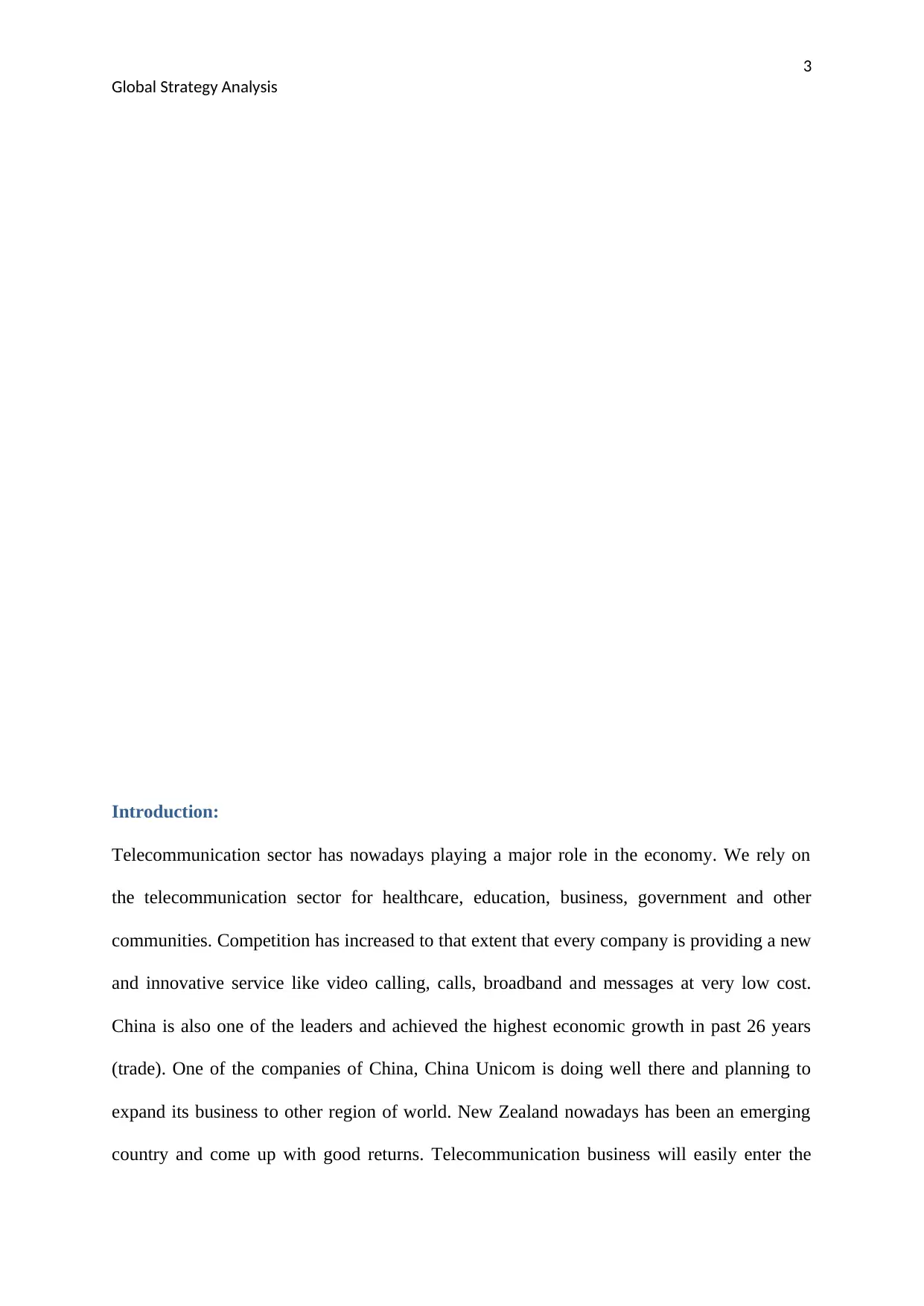
3
Global Strategy Analysis
Introduction:
Telecommunication sector has nowadays playing a major role in the economy. We rely on
the telecommunication sector for healthcare, education, business, government and other
communities. Competition has increased to that extent that every company is providing a new
and innovative service like video calling, calls, broadband and messages at very low cost.
China is also one of the leaders and achieved the highest economic growth in past 26 years
(trade). One of the companies of China, China Unicom is doing well there and planning to
expand its business to other region of world. New Zealand nowadays has been an emerging
country and come up with good returns. Telecommunication business will easily enter the
Global Strategy Analysis
Introduction:
Telecommunication sector has nowadays playing a major role in the economy. We rely on
the telecommunication sector for healthcare, education, business, government and other
communities. Competition has increased to that extent that every company is providing a new
and innovative service like video calling, calls, broadband and messages at very low cost.
China is also one of the leaders and achieved the highest economic growth in past 26 years
(trade). One of the companies of China, China Unicom is doing well there and planning to
expand its business to other region of world. New Zealand nowadays has been an emerging
country and come up with good returns. Telecommunication business will easily enter the
Paraphrase This Document
Need a fresh take? Get an instant paraphrase of this document with our AI Paraphraser
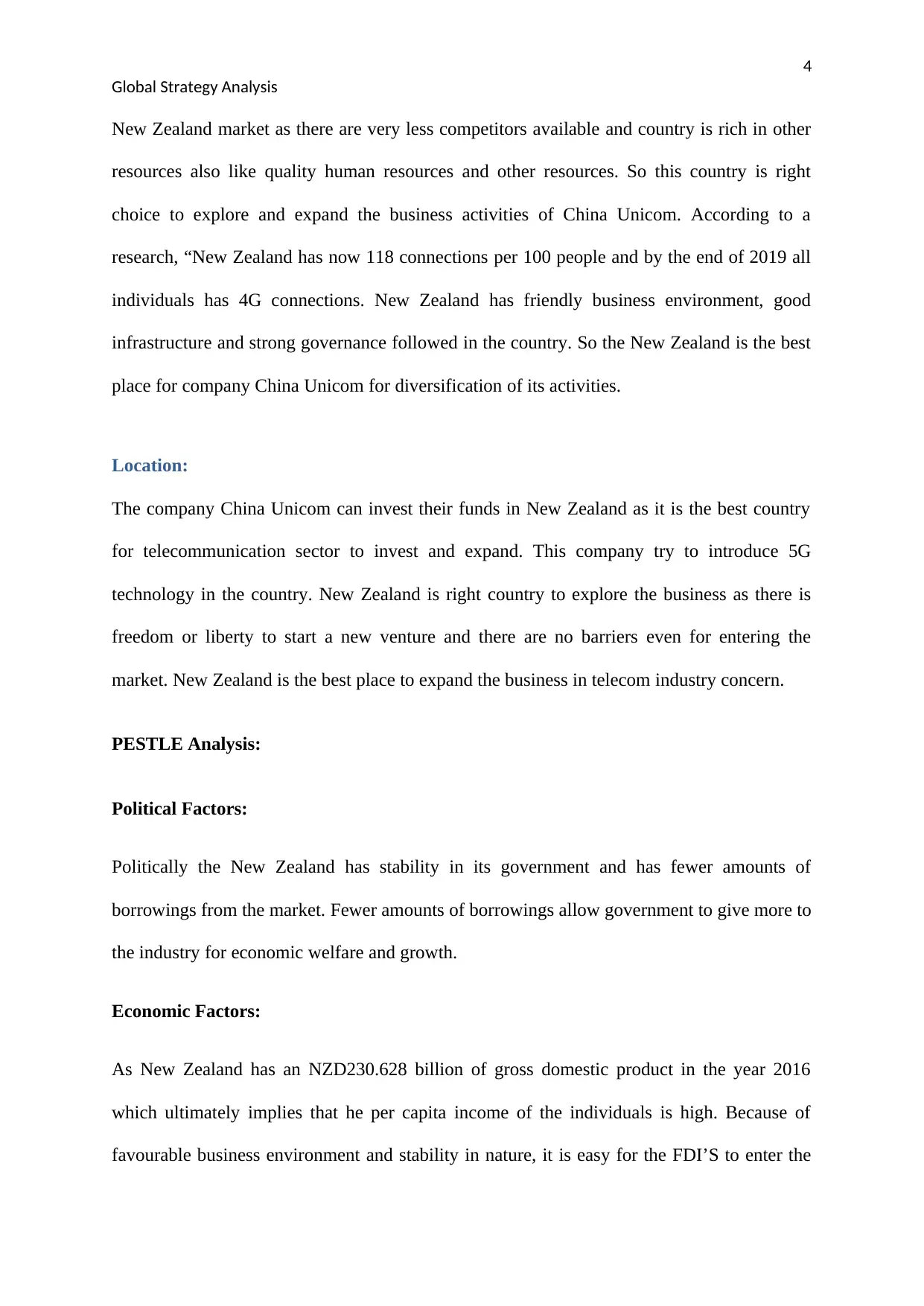
4
Global Strategy Analysis
New Zealand market as there are very less competitors available and country is rich in other
resources also like quality human resources and other resources. So this country is right
choice to explore and expand the business activities of China Unicom. According to a
research, “New Zealand has now 118 connections per 100 people and by the end of 2019 all
individuals has 4G connections. New Zealand has friendly business environment, good
infrastructure and strong governance followed in the country. So the New Zealand is the best
place for company China Unicom for diversification of its activities.
Location:
The company China Unicom can invest their funds in New Zealand as it is the best country
for telecommunication sector to invest and expand. This company try to introduce 5G
technology in the country. New Zealand is right country to explore the business as there is
freedom or liberty to start a new venture and there are no barriers even for entering the
market. New Zealand is the best place to expand the business in telecom industry concern.
PESTLE Analysis:
Political Factors:
Politically the New Zealand has stability in its government and has fewer amounts of
borrowings from the market. Fewer amounts of borrowings allow government to give more to
the industry for economic welfare and growth.
Economic Factors:
As New Zealand has an NZD230.628 billion of gross domestic product in the year 2016
which ultimately implies that he per capita income of the individuals is high. Because of
favourable business environment and stability in nature, it is easy for the FDI’S to enter the
Global Strategy Analysis
New Zealand market as there are very less competitors available and country is rich in other
resources also like quality human resources and other resources. So this country is right
choice to explore and expand the business activities of China Unicom. According to a
research, “New Zealand has now 118 connections per 100 people and by the end of 2019 all
individuals has 4G connections. New Zealand has friendly business environment, good
infrastructure and strong governance followed in the country. So the New Zealand is the best
place for company China Unicom for diversification of its activities.
Location:
The company China Unicom can invest their funds in New Zealand as it is the best country
for telecommunication sector to invest and expand. This company try to introduce 5G
technology in the country. New Zealand is right country to explore the business as there is
freedom or liberty to start a new venture and there are no barriers even for entering the
market. New Zealand is the best place to expand the business in telecom industry concern.
PESTLE Analysis:
Political Factors:
Politically the New Zealand has stability in its government and has fewer amounts of
borrowings from the market. Fewer amounts of borrowings allow government to give more to
the industry for economic welfare and growth.
Economic Factors:
As New Zealand has an NZD230.628 billion of gross domestic product in the year 2016
which ultimately implies that he per capita income of the individuals is high. Because of
favourable business environment and stability in nature, it is easy for the FDI’S to enter the
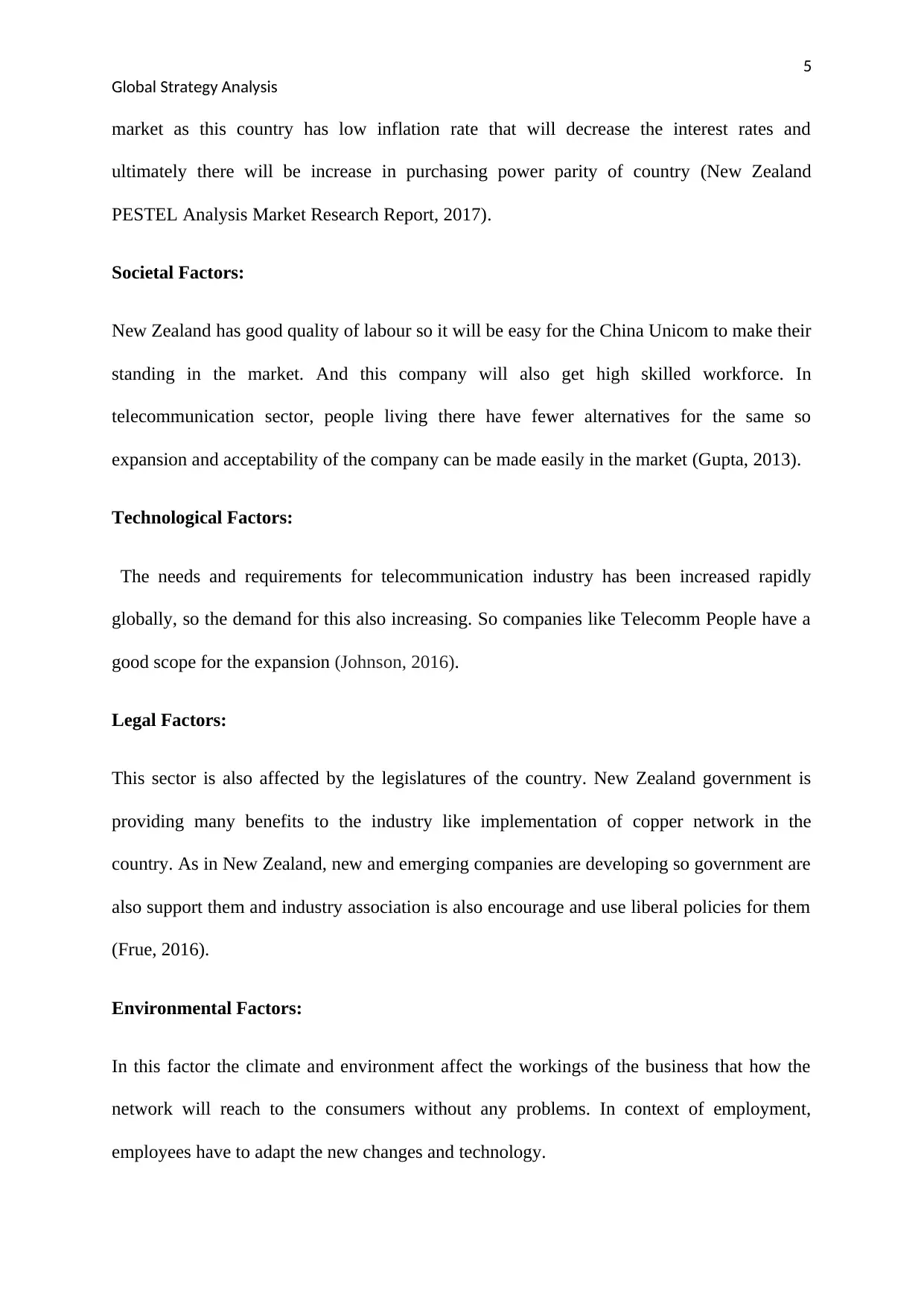
5
Global Strategy Analysis
market as this country has low inflation rate that will decrease the interest rates and
ultimately there will be increase in purchasing power parity of country (New Zealand
PESTEL Analysis Market Research Report, 2017).
Societal Factors:
New Zealand has good quality of labour so it will be easy for the China Unicom to make their
standing in the market. And this company will also get high skilled workforce. In
telecommunication sector, people living there have fewer alternatives for the same so
expansion and acceptability of the company can be made easily in the market (Gupta, 2013).
Technological Factors:
The needs and requirements for telecommunication industry has been increased rapidly
globally, so the demand for this also increasing. So companies like Telecomm People have a
good scope for the expansion (Johnson, 2016).
Legal Factors:
This sector is also affected by the legislatures of the country. New Zealand government is
providing many benefits to the industry like implementation of copper network in the
country. As in New Zealand, new and emerging companies are developing so government are
also support them and industry association is also encourage and use liberal policies for them
(Frue, 2016).
Environmental Factors:
In this factor the climate and environment affect the workings of the business that how the
network will reach to the consumers without any problems. In context of employment,
employees have to adapt the new changes and technology.
Global Strategy Analysis
market as this country has low inflation rate that will decrease the interest rates and
ultimately there will be increase in purchasing power parity of country (New Zealand
PESTEL Analysis Market Research Report, 2017).
Societal Factors:
New Zealand has good quality of labour so it will be easy for the China Unicom to make their
standing in the market. And this company will also get high skilled workforce. In
telecommunication sector, people living there have fewer alternatives for the same so
expansion and acceptability of the company can be made easily in the market (Gupta, 2013).
Technological Factors:
The needs and requirements for telecommunication industry has been increased rapidly
globally, so the demand for this also increasing. So companies like Telecomm People have a
good scope for the expansion (Johnson, 2016).
Legal Factors:
This sector is also affected by the legislatures of the country. New Zealand government is
providing many benefits to the industry like implementation of copper network in the
country. As in New Zealand, new and emerging companies are developing so government are
also support them and industry association is also encourage and use liberal policies for them
(Frue, 2016).
Environmental Factors:
In this factor the climate and environment affect the workings of the business that how the
network will reach to the consumers without any problems. In context of employment,
employees have to adapt the new changes and technology.
⊘ This is a preview!⊘
Do you want full access?
Subscribe today to unlock all pages.

Trusted by 1+ million students worldwide
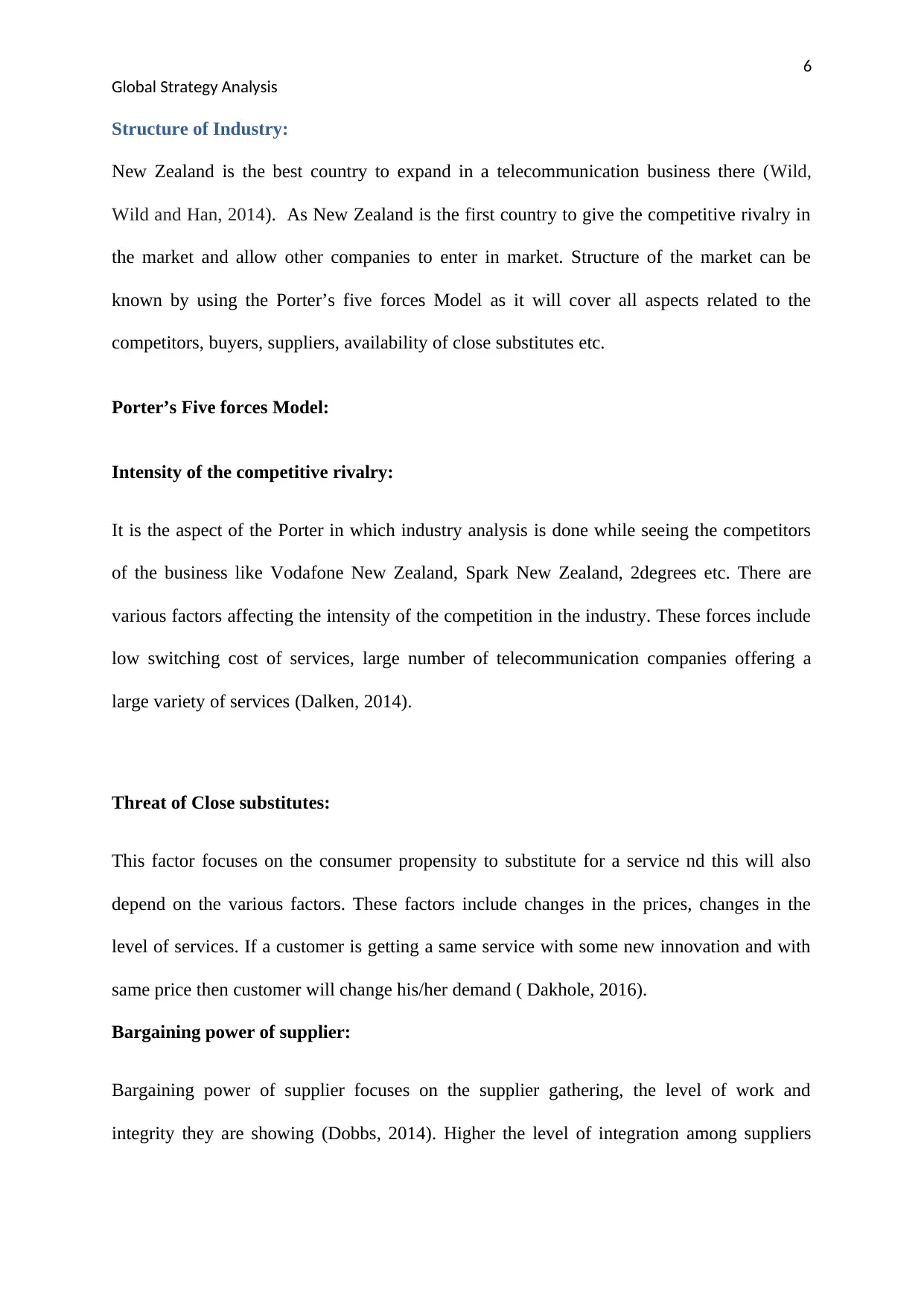
6
Global Strategy Analysis
Structure of Industry:
New Zealand is the best country to expand in a telecommunication business there (Wild,
Wild and Han, 2014). As New Zealand is the first country to give the competitive rivalry in
the market and allow other companies to enter in market. Structure of the market can be
known by using the Porter’s five forces Model as it will cover all aspects related to the
competitors, buyers, suppliers, availability of close substitutes etc.
Porter’s Five forces Model:
Intensity of the competitive rivalry:
It is the aspect of the Porter in which industry analysis is done while seeing the competitors
of the business like Vodafone New Zealand, Spark New Zealand, 2degrees etc. There are
various factors affecting the intensity of the competition in the industry. These forces include
low switching cost of services, large number of telecommunication companies offering a
large variety of services (Dalken, 2014).
Threat of Close substitutes:
This factor focuses on the consumer propensity to substitute for a service nd this will also
depend on the various factors. These factors include changes in the prices, changes in the
level of services. If a customer is getting a same service with some new innovation and with
same price then customer will change his/her demand ( Dakhole, 2016).
Bargaining power of supplier:
Bargaining power of supplier focuses on the supplier gathering, the level of work and
integrity they are showing (Dobbs, 2014). Higher the level of integration among suppliers
Global Strategy Analysis
Structure of Industry:
New Zealand is the best country to expand in a telecommunication business there (Wild,
Wild and Han, 2014). As New Zealand is the first country to give the competitive rivalry in
the market and allow other companies to enter in market. Structure of the market can be
known by using the Porter’s five forces Model as it will cover all aspects related to the
competitors, buyers, suppliers, availability of close substitutes etc.
Porter’s Five forces Model:
Intensity of the competitive rivalry:
It is the aspect of the Porter in which industry analysis is done while seeing the competitors
of the business like Vodafone New Zealand, Spark New Zealand, 2degrees etc. There are
various factors affecting the intensity of the competition in the industry. These forces include
low switching cost of services, large number of telecommunication companies offering a
large variety of services (Dalken, 2014).
Threat of Close substitutes:
This factor focuses on the consumer propensity to substitute for a service nd this will also
depend on the various factors. These factors include changes in the prices, changes in the
level of services. If a customer is getting a same service with some new innovation and with
same price then customer will change his/her demand ( Dakhole, 2016).
Bargaining power of supplier:
Bargaining power of supplier focuses on the supplier gathering, the level of work and
integrity they are showing (Dobbs, 2014). Higher the level of integration among suppliers
Paraphrase This Document
Need a fresh take? Get an instant paraphrase of this document with our AI Paraphraser
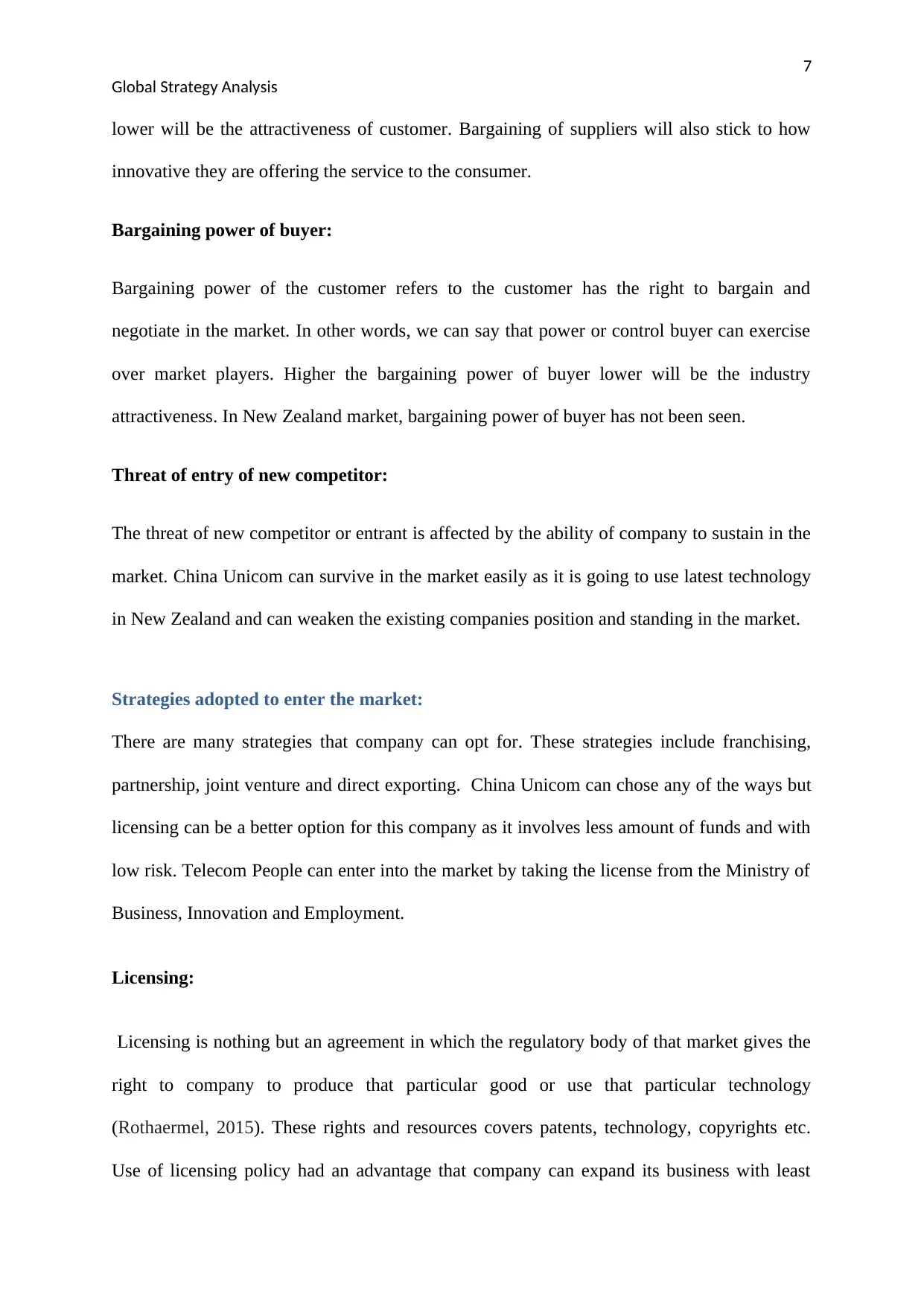
7
Global Strategy Analysis
lower will be the attractiveness of customer. Bargaining of suppliers will also stick to how
innovative they are offering the service to the consumer.
Bargaining power of buyer:
Bargaining power of the customer refers to the customer has the right to bargain and
negotiate in the market. In other words, we can say that power or control buyer can exercise
over market players. Higher the bargaining power of buyer lower will be the industry
attractiveness. In New Zealand market, bargaining power of buyer has not been seen.
Threat of entry of new competitor:
The threat of new competitor or entrant is affected by the ability of company to sustain in the
market. China Unicom can survive in the market easily as it is going to use latest technology
in New Zealand and can weaken the existing companies position and standing in the market.
Strategies adopted to enter the market:
There are many strategies that company can opt for. These strategies include franchising,
partnership, joint venture and direct exporting. China Unicom can chose any of the ways but
licensing can be a better option for this company as it involves less amount of funds and with
low risk. Telecom People can enter into the market by taking the license from the Ministry of
Business, Innovation and Employment.
Licensing:
Licensing is nothing but an agreement in which the regulatory body of that market gives the
right to company to produce that particular good or use that particular technology
(Rothaermel, 2015). These rights and resources covers patents, technology, copyrights etc.
Use of licensing policy had an advantage that company can expand its business with least
Global Strategy Analysis
lower will be the attractiveness of customer. Bargaining of suppliers will also stick to how
innovative they are offering the service to the consumer.
Bargaining power of buyer:
Bargaining power of the customer refers to the customer has the right to bargain and
negotiate in the market. In other words, we can say that power or control buyer can exercise
over market players. Higher the bargaining power of buyer lower will be the industry
attractiveness. In New Zealand market, bargaining power of buyer has not been seen.
Threat of entry of new competitor:
The threat of new competitor or entrant is affected by the ability of company to sustain in the
market. China Unicom can survive in the market easily as it is going to use latest technology
in New Zealand and can weaken the existing companies position and standing in the market.
Strategies adopted to enter the market:
There are many strategies that company can opt for. These strategies include franchising,
partnership, joint venture and direct exporting. China Unicom can chose any of the ways but
licensing can be a better option for this company as it involves less amount of funds and with
low risk. Telecom People can enter into the market by taking the license from the Ministry of
Business, Innovation and Employment.
Licensing:
Licensing is nothing but an agreement in which the regulatory body of that market gives the
right to company to produce that particular good or use that particular technology
(Rothaermel, 2015). These rights and resources covers patents, technology, copyrights etc.
Use of licensing policy had an advantage that company can expand its business with least
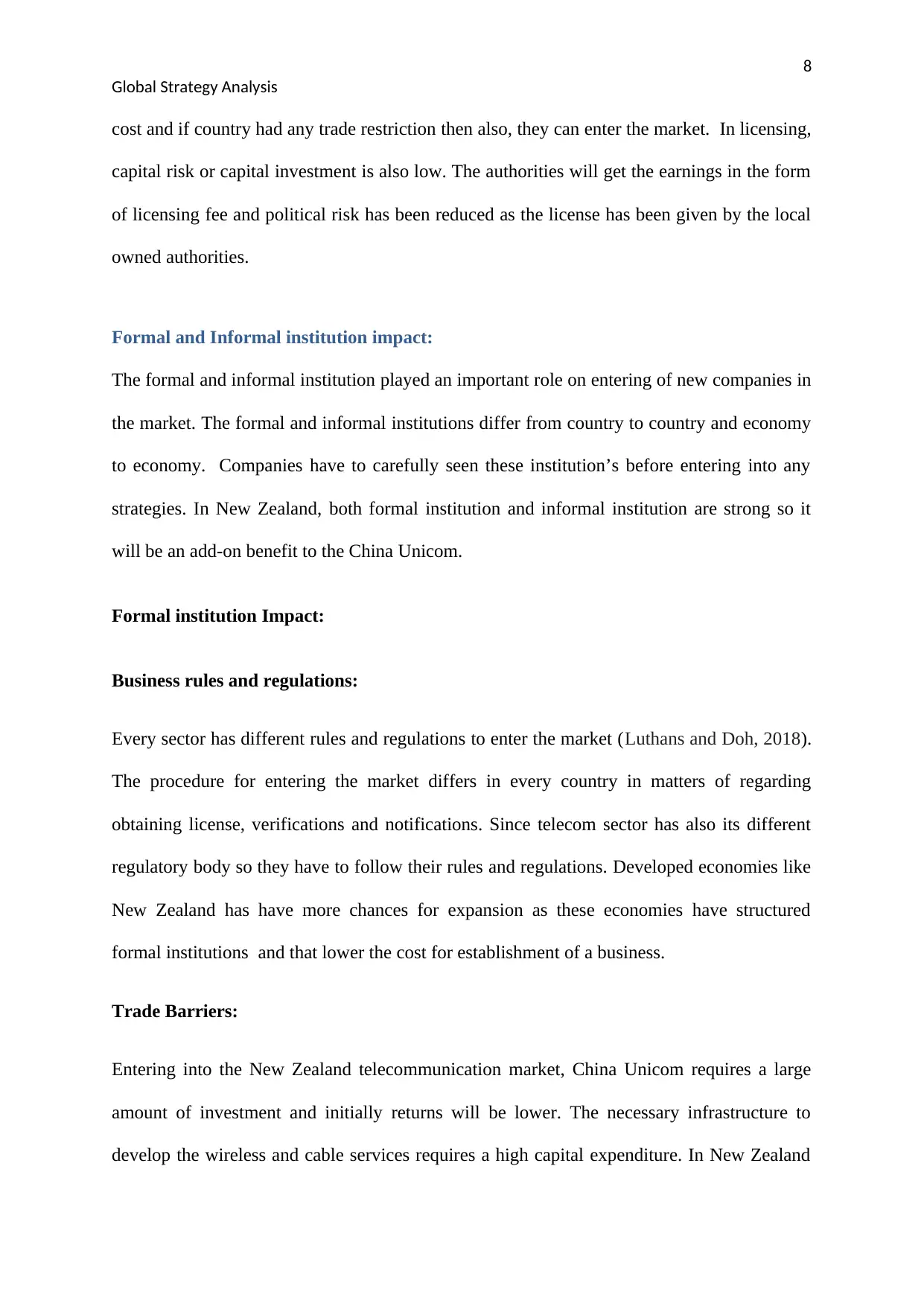
8
Global Strategy Analysis
cost and if country had any trade restriction then also, they can enter the market. In licensing,
capital risk or capital investment is also low. The authorities will get the earnings in the form
of licensing fee and political risk has been reduced as the license has been given by the local
owned authorities.
Formal and Informal institution impact:
The formal and informal institution played an important role on entering of new companies in
the market. The formal and informal institutions differ from country to country and economy
to economy. Companies have to carefully seen these institution’s before entering into any
strategies. In New Zealand, both formal institution and informal institution are strong so it
will be an add-on benefit to the China Unicom.
Formal institution Impact:
Business rules and regulations:
Every sector has different rules and regulations to enter the market (Luthans and Doh, 2018).
The procedure for entering the market differs in every country in matters of regarding
obtaining license, verifications and notifications. Since telecom sector has also its different
regulatory body so they have to follow their rules and regulations. Developed economies like
New Zealand has have more chances for expansion as these economies have structured
formal institutions and that lower the cost for establishment of a business.
Trade Barriers:
Entering into the New Zealand telecommunication market, China Unicom requires a large
amount of investment and initially returns will be lower. The necessary infrastructure to
develop the wireless and cable services requires a high capital expenditure. In New Zealand
Global Strategy Analysis
cost and if country had any trade restriction then also, they can enter the market. In licensing,
capital risk or capital investment is also low. The authorities will get the earnings in the form
of licensing fee and political risk has been reduced as the license has been given by the local
owned authorities.
Formal and Informal institution impact:
The formal and informal institution played an important role on entering of new companies in
the market. The formal and informal institutions differ from country to country and economy
to economy. Companies have to carefully seen these institution’s before entering into any
strategies. In New Zealand, both formal institution and informal institution are strong so it
will be an add-on benefit to the China Unicom.
Formal institution Impact:
Business rules and regulations:
Every sector has different rules and regulations to enter the market (Luthans and Doh, 2018).
The procedure for entering the market differs in every country in matters of regarding
obtaining license, verifications and notifications. Since telecom sector has also its different
regulatory body so they have to follow their rules and regulations. Developed economies like
New Zealand has have more chances for expansion as these economies have structured
formal institutions and that lower the cost for establishment of a business.
Trade Barriers:
Entering into the New Zealand telecommunication market, China Unicom requires a large
amount of investment and initially returns will be lower. The necessary infrastructure to
develop the wireless and cable services requires a high capital expenditure. In New Zealand
⊘ This is a preview!⊘
Do you want full access?
Subscribe today to unlock all pages.

Trusted by 1+ million students worldwide
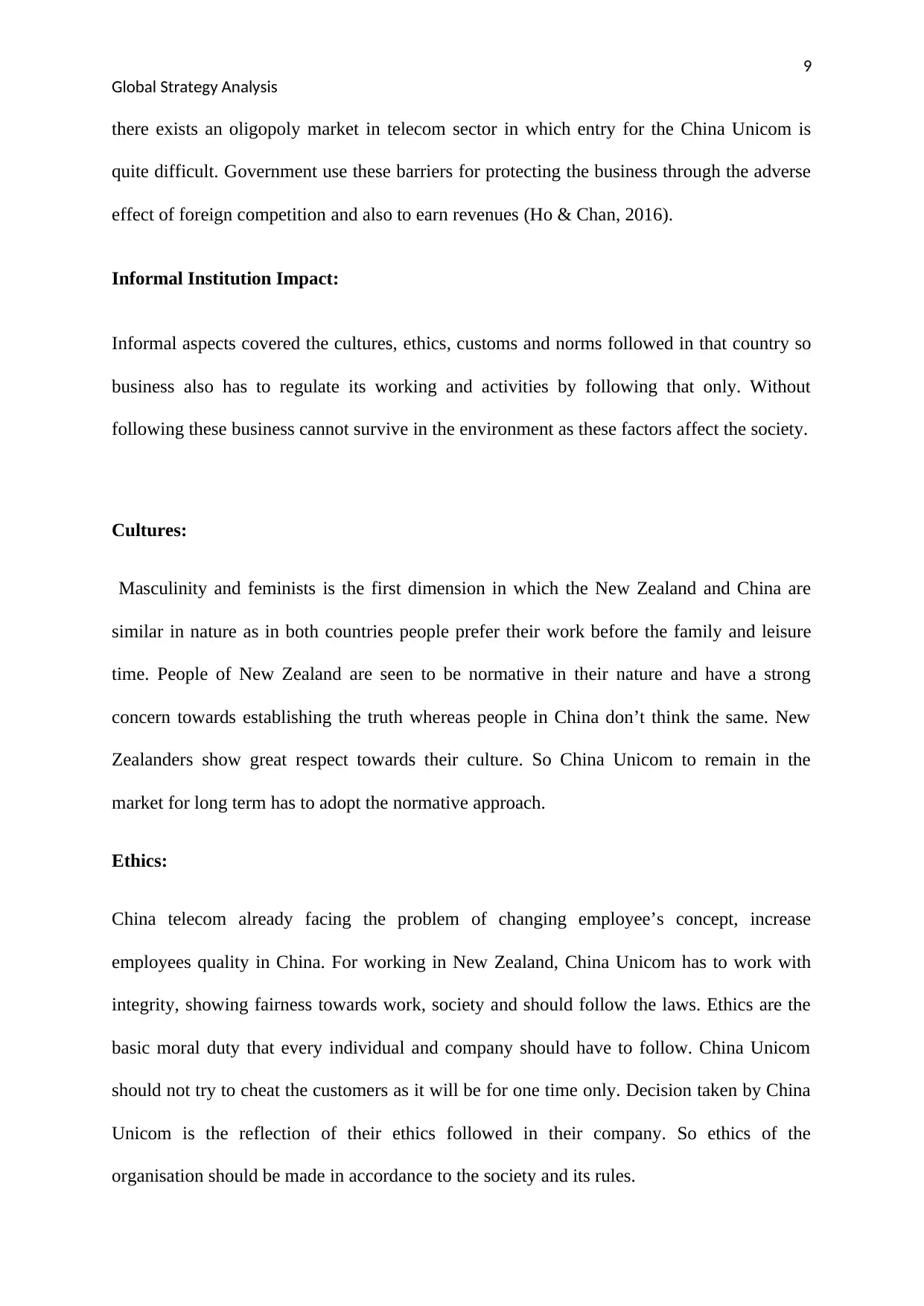
9
Global Strategy Analysis
there exists an oligopoly market in telecom sector in which entry for the China Unicom is
quite difficult. Government use these barriers for protecting the business through the adverse
effect of foreign competition and also to earn revenues (Ho & Chan, 2016).
Informal Institution Impact:
Informal aspects covered the cultures, ethics, customs and norms followed in that country so
business also has to regulate its working and activities by following that only. Without
following these business cannot survive in the environment as these factors affect the society.
Cultures:
Masculinity and feminists is the first dimension in which the New Zealand and China are
similar in nature as in both countries people prefer their work before the family and leisure
time. People of New Zealand are seen to be normative in their nature and have a strong
concern towards establishing the truth whereas people in China don’t think the same. New
Zealanders show great respect towards their culture. So China Unicom to remain in the
market for long term has to adopt the normative approach.
Ethics:
China telecom already facing the problem of changing employee’s concept, increase
employees quality in China. For working in New Zealand, China Unicom has to work with
integrity, showing fairness towards work, society and should follow the laws. Ethics are the
basic moral duty that every individual and company should have to follow. China Unicom
should not try to cheat the customers as it will be for one time only. Decision taken by China
Unicom is the reflection of their ethics followed in their company. So ethics of the
organisation should be made in accordance to the society and its rules.
Global Strategy Analysis
there exists an oligopoly market in telecom sector in which entry for the China Unicom is
quite difficult. Government use these barriers for protecting the business through the adverse
effect of foreign competition and also to earn revenues (Ho & Chan, 2016).
Informal Institution Impact:
Informal aspects covered the cultures, ethics, customs and norms followed in that country so
business also has to regulate its working and activities by following that only. Without
following these business cannot survive in the environment as these factors affect the society.
Cultures:
Masculinity and feminists is the first dimension in which the New Zealand and China are
similar in nature as in both countries people prefer their work before the family and leisure
time. People of New Zealand are seen to be normative in their nature and have a strong
concern towards establishing the truth whereas people in China don’t think the same. New
Zealanders show great respect towards their culture. So China Unicom to remain in the
market for long term has to adopt the normative approach.
Ethics:
China telecom already facing the problem of changing employee’s concept, increase
employees quality in China. For working in New Zealand, China Unicom has to work with
integrity, showing fairness towards work, society and should follow the laws. Ethics are the
basic moral duty that every individual and company should have to follow. China Unicom
should not try to cheat the customers as it will be for one time only. Decision taken by China
Unicom is the reflection of their ethics followed in their company. So ethics of the
organisation should be made in accordance to the society and its rules.
Paraphrase This Document
Need a fresh take? Get an instant paraphrase of this document with our AI Paraphraser
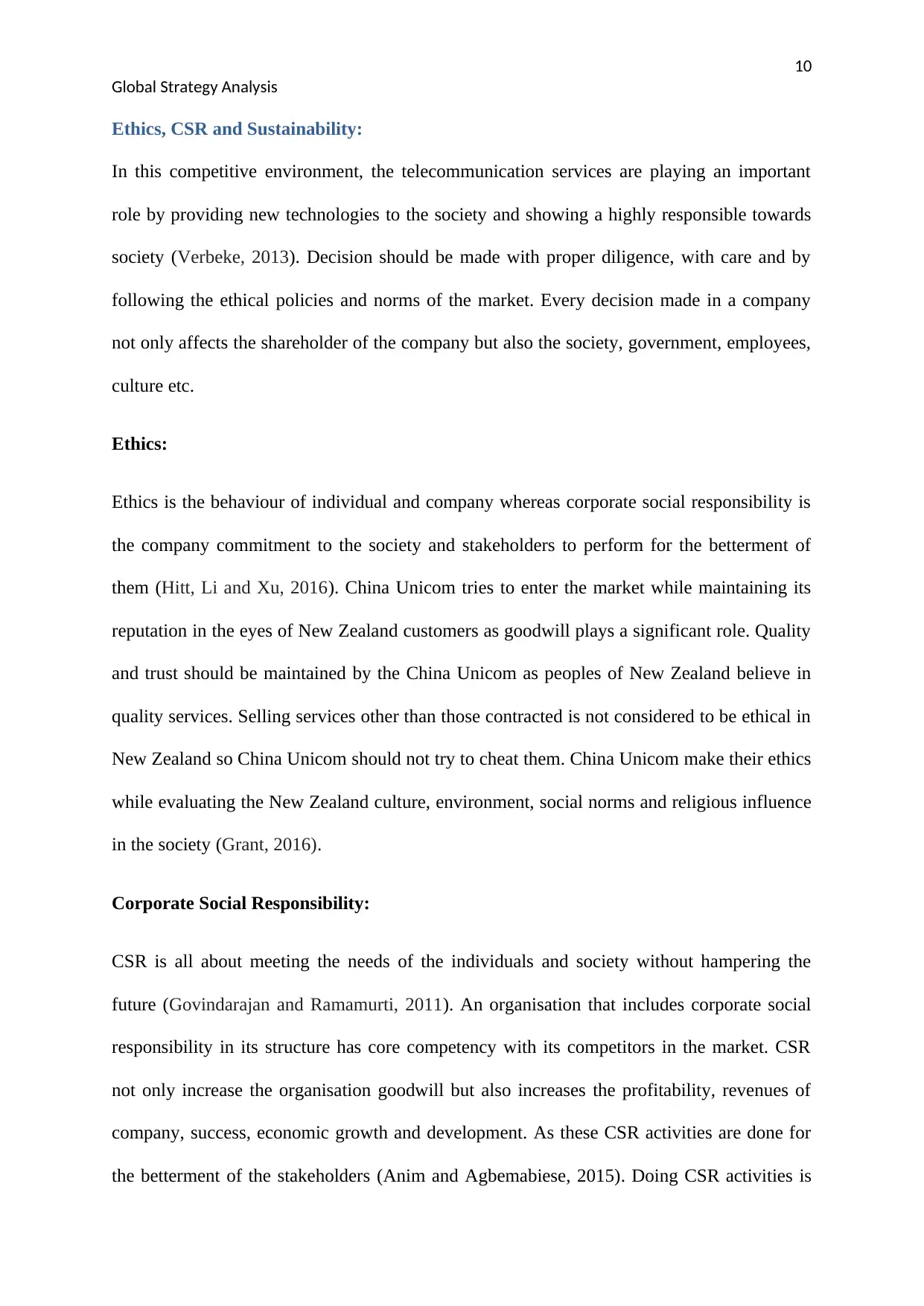
10
Global Strategy Analysis
Ethics, CSR and Sustainability:
In this competitive environment, the telecommunication services are playing an important
role by providing new technologies to the society and showing a highly responsible towards
society (Verbeke, 2013). Decision should be made with proper diligence, with care and by
following the ethical policies and norms of the market. Every decision made in a company
not only affects the shareholder of the company but also the society, government, employees,
culture etc.
Ethics:
Ethics is the behaviour of individual and company whereas corporate social responsibility is
the company commitment to the society and stakeholders to perform for the betterment of
them (Hitt, Li and Xu, 2016). China Unicom tries to enter the market while maintaining its
reputation in the eyes of New Zealand customers as goodwill plays a significant role. Quality
and trust should be maintained by the China Unicom as peoples of New Zealand believe in
quality services. Selling services other than those contracted is not considered to be ethical in
New Zealand so China Unicom should not try to cheat them. China Unicom make their ethics
while evaluating the New Zealand culture, environment, social norms and religious influence
in the society (Grant, 2016).
Corporate Social Responsibility:
CSR is all about meeting the needs of the individuals and society without hampering the
future (Govindarajan and Ramamurti, 2011). An organisation that includes corporate social
responsibility in its structure has core competency with its competitors in the market. CSR
not only increase the organisation goodwill but also increases the profitability, revenues of
company, success, economic growth and development. As these CSR activities are done for
the betterment of the stakeholders (Anim and Agbemabiese, 2015). Doing CSR activities is
Global Strategy Analysis
Ethics, CSR and Sustainability:
In this competitive environment, the telecommunication services are playing an important
role by providing new technologies to the society and showing a highly responsible towards
society (Verbeke, 2013). Decision should be made with proper diligence, with care and by
following the ethical policies and norms of the market. Every decision made in a company
not only affects the shareholder of the company but also the society, government, employees,
culture etc.
Ethics:
Ethics is the behaviour of individual and company whereas corporate social responsibility is
the company commitment to the society and stakeholders to perform for the betterment of
them (Hitt, Li and Xu, 2016). China Unicom tries to enter the market while maintaining its
reputation in the eyes of New Zealand customers as goodwill plays a significant role. Quality
and trust should be maintained by the China Unicom as peoples of New Zealand believe in
quality services. Selling services other than those contracted is not considered to be ethical in
New Zealand so China Unicom should not try to cheat them. China Unicom make their ethics
while evaluating the New Zealand culture, environment, social norms and religious influence
in the society (Grant, 2016).
Corporate Social Responsibility:
CSR is all about meeting the needs of the individuals and society without hampering the
future (Govindarajan and Ramamurti, 2011). An organisation that includes corporate social
responsibility in its structure has core competency with its competitors in the market. CSR
not only increase the organisation goodwill but also increases the profitability, revenues of
company, success, economic growth and development. As these CSR activities are done for
the betterment of the stakeholders (Anim and Agbemabiese, 2015). Doing CSR activities is
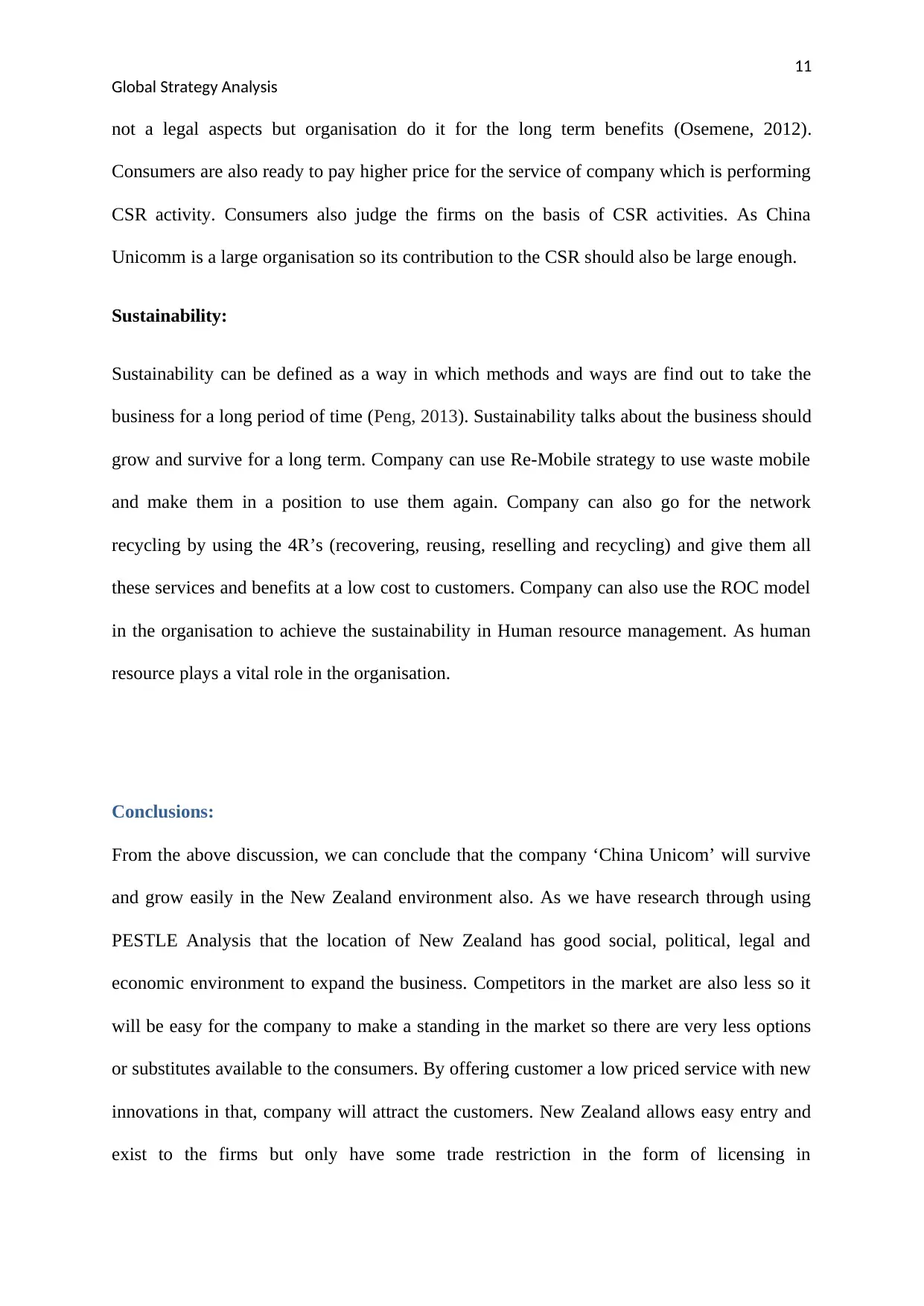
11
Global Strategy Analysis
not a legal aspects but organisation do it for the long term benefits (Osemene, 2012).
Consumers are also ready to pay higher price for the service of company which is performing
CSR activity. Consumers also judge the firms on the basis of CSR activities. As China
Unicomm is a large organisation so its contribution to the CSR should also be large enough.
Sustainability:
Sustainability can be defined as a way in which methods and ways are find out to take the
business for a long period of time (Peng, 2013). Sustainability talks about the business should
grow and survive for a long term. Company can use Re-Mobile strategy to use waste mobile
and make them in a position to use them again. Company can also go for the network
recycling by using the 4R’s (recovering, reusing, reselling and recycling) and give them all
these services and benefits at a low cost to customers. Company can also use the ROC model
in the organisation to achieve the sustainability in Human resource management. As human
resource plays a vital role in the organisation.
Conclusions:
From the above discussion, we can conclude that the company ‘China Unicom’ will survive
and grow easily in the New Zealand environment also. As we have research through using
PESTLE Analysis that the location of New Zealand has good social, political, legal and
economic environment to expand the business. Competitors in the market are also less so it
will be easy for the company to make a standing in the market so there are very less options
or substitutes available to the consumers. By offering customer a low priced service with new
innovations in that, company will attract the customers. New Zealand allows easy entry and
exist to the firms but only have some trade restriction in the form of licensing in
Global Strategy Analysis
not a legal aspects but organisation do it for the long term benefits (Osemene, 2012).
Consumers are also ready to pay higher price for the service of company which is performing
CSR activity. Consumers also judge the firms on the basis of CSR activities. As China
Unicomm is a large organisation so its contribution to the CSR should also be large enough.
Sustainability:
Sustainability can be defined as a way in which methods and ways are find out to take the
business for a long period of time (Peng, 2013). Sustainability talks about the business should
grow and survive for a long term. Company can use Re-Mobile strategy to use waste mobile
and make them in a position to use them again. Company can also go for the network
recycling by using the 4R’s (recovering, reusing, reselling and recycling) and give them all
these services and benefits at a low cost to customers. Company can also use the ROC model
in the organisation to achieve the sustainability in Human resource management. As human
resource plays a vital role in the organisation.
Conclusions:
From the above discussion, we can conclude that the company ‘China Unicom’ will survive
and grow easily in the New Zealand environment also. As we have research through using
PESTLE Analysis that the location of New Zealand has good social, political, legal and
economic environment to expand the business. Competitors in the market are also less so it
will be easy for the company to make a standing in the market so there are very less options
or substitutes available to the consumers. By offering customer a low priced service with new
innovations in that, company will attract the customers. New Zealand allows easy entry and
exist to the firms but only have some trade restriction in the form of licensing in
⊘ This is a preview!⊘
Do you want full access?
Subscribe today to unlock all pages.

Trusted by 1+ million students worldwide
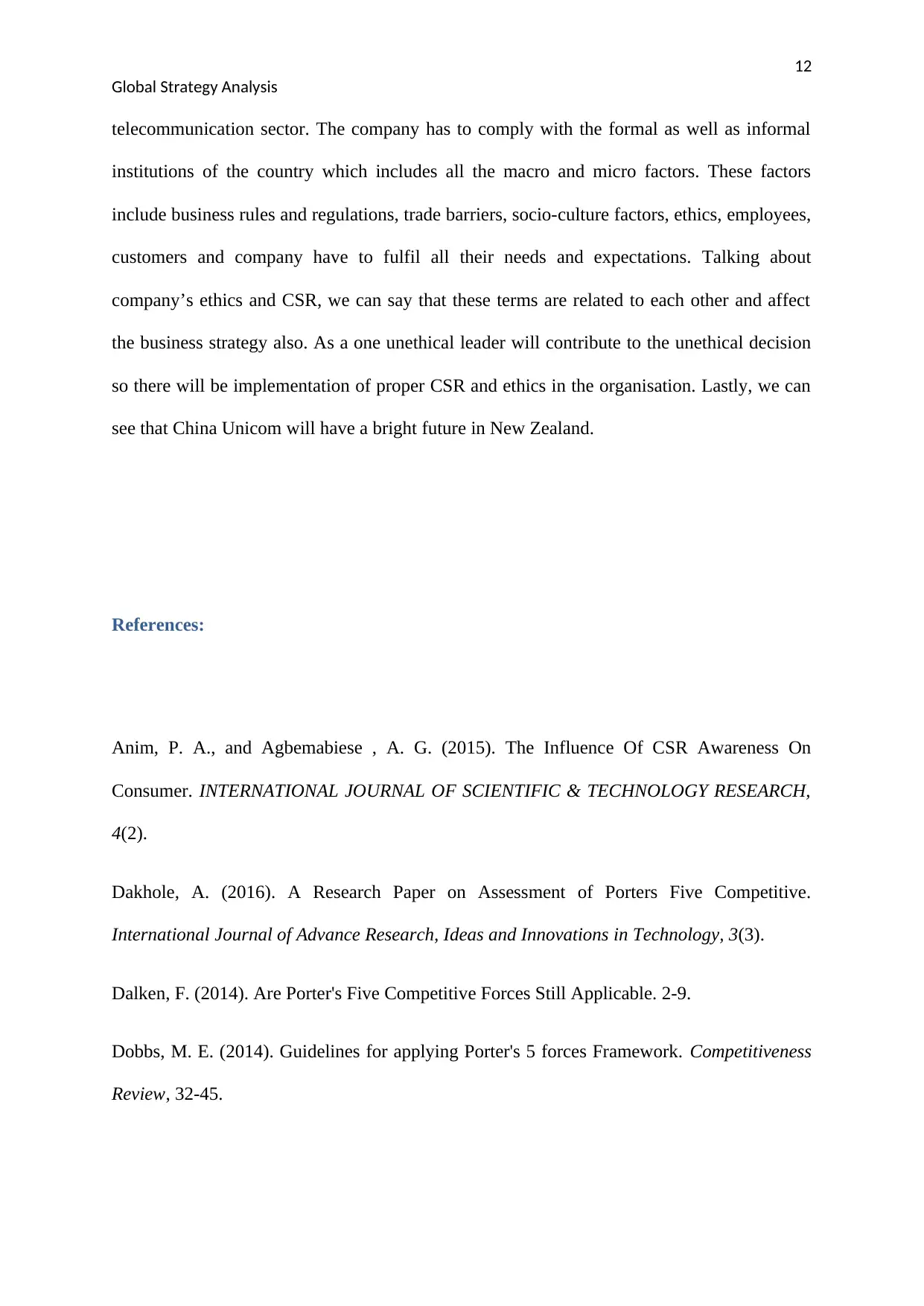
12
Global Strategy Analysis
telecommunication sector. The company has to comply with the formal as well as informal
institutions of the country which includes all the macro and micro factors. These factors
include business rules and regulations, trade barriers, socio-culture factors, ethics, employees,
customers and company have to fulfil all their needs and expectations. Talking about
company’s ethics and CSR, we can say that these terms are related to each other and affect
the business strategy also. As a one unethical leader will contribute to the unethical decision
so there will be implementation of proper CSR and ethics in the organisation. Lastly, we can
see that China Unicom will have a bright future in New Zealand.
References:
Anim, P. A., and Agbemabiese , A. G. (2015). The Influence Of CSR Awareness On
Consumer. INTERNATIONAL JOURNAL OF SCIENTIFIC & TECHNOLOGY RESEARCH,
4(2).
Dakhole, A. (2016). A Research Paper on Assessment of Porters Five Competitive.
International Journal of Advance Research, Ideas and Innovations in Technology, 3(3).
Dalken, F. (2014). Are Porter's Five Competitive Forces Still Applicable. 2-9.
Dobbs, M. E. (2014). Guidelines for applying Porter's 5 forces Framework. Competitiveness
Review, 32-45.
Global Strategy Analysis
telecommunication sector. The company has to comply with the formal as well as informal
institutions of the country which includes all the macro and micro factors. These factors
include business rules and regulations, trade barriers, socio-culture factors, ethics, employees,
customers and company have to fulfil all their needs and expectations. Talking about
company’s ethics and CSR, we can say that these terms are related to each other and affect
the business strategy also. As a one unethical leader will contribute to the unethical decision
so there will be implementation of proper CSR and ethics in the organisation. Lastly, we can
see that China Unicom will have a bright future in New Zealand.
References:
Anim, P. A., and Agbemabiese , A. G. (2015). The Influence Of CSR Awareness On
Consumer. INTERNATIONAL JOURNAL OF SCIENTIFIC & TECHNOLOGY RESEARCH,
4(2).
Dakhole, A. (2016). A Research Paper on Assessment of Porters Five Competitive.
International Journal of Advance Research, Ideas and Innovations in Technology, 3(3).
Dalken, F. (2014). Are Porter's Five Competitive Forces Still Applicable. 2-9.
Dobbs, M. E. (2014). Guidelines for applying Porter's 5 forces Framework. Competitiveness
Review, 32-45.
Paraphrase This Document
Need a fresh take? Get an instant paraphrase of this document with our AI Paraphraser
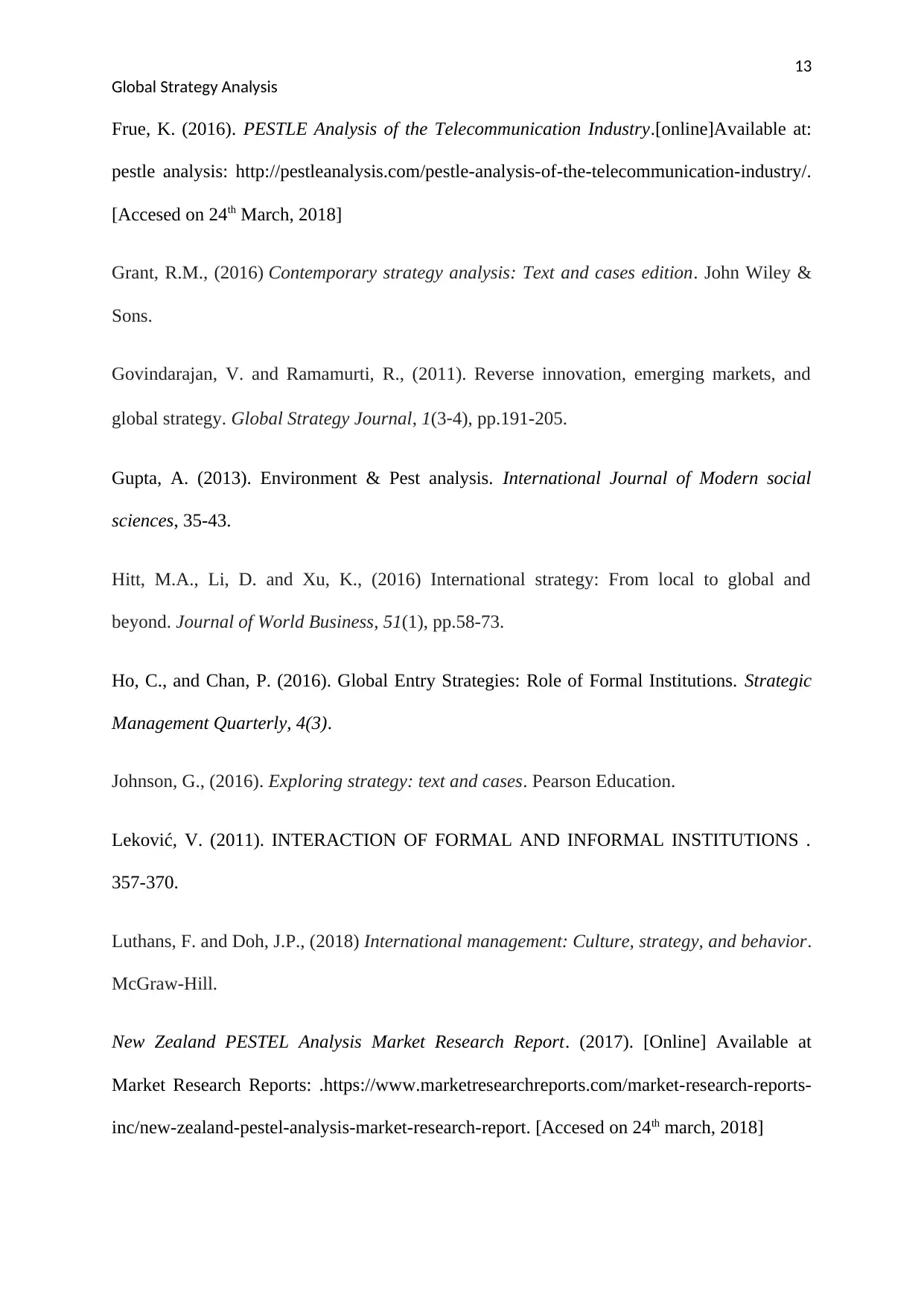
13
Global Strategy Analysis
Frue, K. (2016). PESTLE Analysis of the Telecommunication Industry.[online]Available at:
pestle analysis: http://pestleanalysis.com/pestle-analysis-of-the-telecommunication-industry/.
[Accesed on 24th March, 2018]
Grant, R.M., (2016) Contemporary strategy analysis: Text and cases edition. John Wiley &
Sons.
Govindarajan, V. and Ramamurti, R., (2011). Reverse innovation, emerging markets, and
global strategy. Global Strategy Journal, 1(3‐4), pp.191-205.
Gupta, A. (2013). Environment & Pest analysis. International Journal of Modern social
sciences, 35-43.
Hitt, M.A., Li, D. and Xu, K., (2016) International strategy: From local to global and
beyond. Journal of World Business, 51(1), pp.58-73.
Ho, C., and Chan, P. (2016). Global Entry Strategies: Role of Formal Institutions. Strategic
Management Quarterly, 4(3).
Johnson, G., (2016). Exploring strategy: text and cases. Pearson Education.
Leković, V. (2011). INTERACTION OF FORMAL AND INFORMAL INSTITUTIONS .
357-370.
Luthans, F. and Doh, J.P., (2018) International management: Culture, strategy, and behavior.
McGraw-Hill.
New Zealand PESTEL Analysis Market Research Report. (2017). [Online] Available at
Market Research Reports: .https://www.marketresearchreports.com/market-research-reports-
inc/new-zealand-pestel-analysis-market-research-report. [Accesed on 24th march, 2018]
Global Strategy Analysis
Frue, K. (2016). PESTLE Analysis of the Telecommunication Industry.[online]Available at:
pestle analysis: http://pestleanalysis.com/pestle-analysis-of-the-telecommunication-industry/.
[Accesed on 24th March, 2018]
Grant, R.M., (2016) Contemporary strategy analysis: Text and cases edition. John Wiley &
Sons.
Govindarajan, V. and Ramamurti, R., (2011). Reverse innovation, emerging markets, and
global strategy. Global Strategy Journal, 1(3‐4), pp.191-205.
Gupta, A. (2013). Environment & Pest analysis. International Journal of Modern social
sciences, 35-43.
Hitt, M.A., Li, D. and Xu, K., (2016) International strategy: From local to global and
beyond. Journal of World Business, 51(1), pp.58-73.
Ho, C., and Chan, P. (2016). Global Entry Strategies: Role of Formal Institutions. Strategic
Management Quarterly, 4(3).
Johnson, G., (2016). Exploring strategy: text and cases. Pearson Education.
Leković, V. (2011). INTERACTION OF FORMAL AND INFORMAL INSTITUTIONS .
357-370.
Luthans, F. and Doh, J.P., (2018) International management: Culture, strategy, and behavior.
McGraw-Hill.
New Zealand PESTEL Analysis Market Research Report. (2017). [Online] Available at
Market Research Reports: .https://www.marketresearchreports.com/market-research-reports-
inc/new-zealand-pestel-analysis-market-research-report. [Accesed on 24th march, 2018]
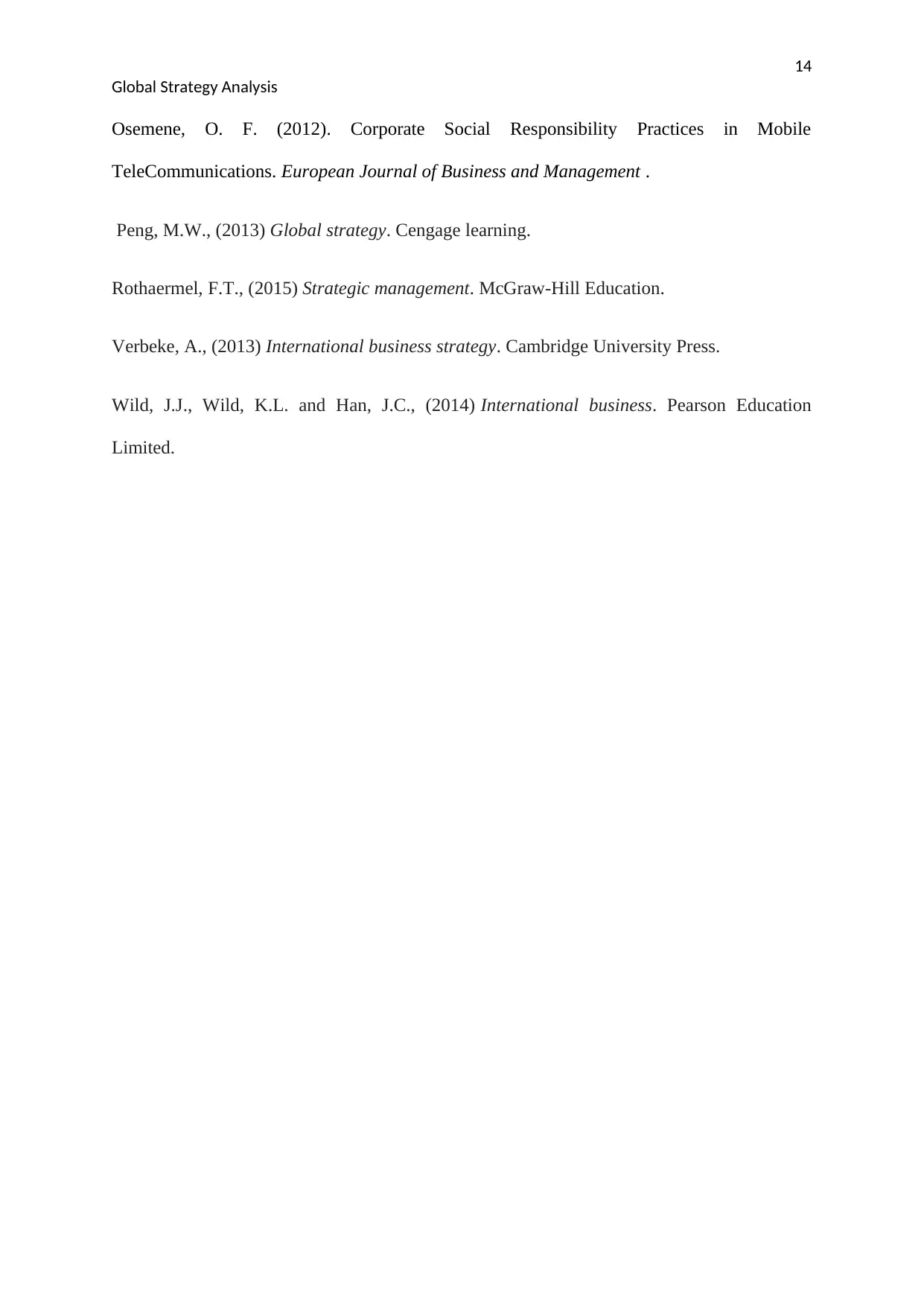
14
Global Strategy Analysis
Osemene, O. F. (2012). Corporate Social Responsibility Practices in Mobile
TeleCommunications. European Journal of Business and Management .
Peng, M.W., (2013) Global strategy. Cengage learning.
Rothaermel, F.T., (2015) Strategic management. McGraw-Hill Education.
Verbeke, A., (2013) International business strategy. Cambridge University Press.
Wild, J.J., Wild, K.L. and Han, J.C., (2014) International business. Pearson Education
Limited.
Global Strategy Analysis
Osemene, O. F. (2012). Corporate Social Responsibility Practices in Mobile
TeleCommunications. European Journal of Business and Management .
Peng, M.W., (2013) Global strategy. Cengage learning.
Rothaermel, F.T., (2015) Strategic management. McGraw-Hill Education.
Verbeke, A., (2013) International business strategy. Cambridge University Press.
Wild, J.J., Wild, K.L. and Han, J.C., (2014) International business. Pearson Education
Limited.
⊘ This is a preview!⊘
Do you want full access?
Subscribe today to unlock all pages.

Trusted by 1+ million students worldwide
1 out of 15
Related Documents
Your All-in-One AI-Powered Toolkit for Academic Success.
+13062052269
info@desklib.com
Available 24*7 on WhatsApp / Email
![[object Object]](/_next/static/media/star-bottom.7253800d.svg)
Unlock your academic potential
© 2024 | Zucol Services PVT LTD | All rights reserved.




